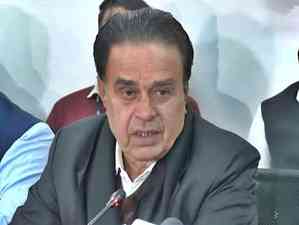Rajasthan: Bhajan Lal Sharma govt annuls 9 districts, 3 divisions formed in Gehlot regime
The Bhajan Lal Sharma-led Rajasthan government on Saturday annulled the creation of nine districts and three divisions formed in the state during the previous Ashok Gehlot administration.

Jaipur, Dec 28 (IANS) The Bhajan Lal Sharma-led Rajasthan government on Saturday annulled the creation of nine districts and three divisions formed in the state during the previous Ashok Gehlot administration.
This decision was finalised during a Cabinet meeting held on Saturday. Rajasthan will now have 41 districts and 7 divisions.
The three divisions which were annulled include Pali, Sikar and Banswara, while the creation of nine out of the 17 new districts formed during the regime of former Chief Minister Ashok Gehlot's rule which have now been cancelled during the Cabinet meeting, include Dudu, Kekri, Shahpura, Neemkathana, Gangapur City, Jaipur Rural, Jodhpur Rural, Anupgarh and Sanchore.
An official said that the state Cabinet, under the chairmanship of Chief Minister Bhajan Lal Sharma, also took some significant decisions on Saturday to promote good governance, youth welfare, and the state's overall development.
During a press conference, Parliamentary Affairs Minister Jogaram Patel announced the re-determination of districts and divisions established during the previous government's tenure. Following this decision, Rajasthan will now have 7 divisions and 41 districts.
Patel stated that the prior administration had declared the creation of new districts and divisions during its final year in office. Notifications of these administrative changes were issued on August 5, 2023.
However, the announcement of three additional districts came just before the enforcement of the Assembly Election-2023 code of conduct, leaving these notifications un-issued.
The Parliamentary Affairs Minister criticised the previous government for prioritising political gains over administrative needs. He noted that the creation of new districts and divisions lacked consideration of key factors such as financial viability, administrative requirements, law and order, and cultural harmony.
Additionally, the necessary posts, office infrastructure, and budgetary provisions were not established for these new units.
To address the shortcomings, a high-level expert committee, chaired by retired IAS officer Lalit K. Panwar, was formed to review the changes. Based on its recommendations, the Cabinet decided to retain eight districts, which are Phalodi, Balotra, Kotputli-Baharod, Khairthal-Tijara, Beawar, Deeg, Didwana-Kuchaman, and Salumber.
However, nine districts, including Anupgarh, Dudu, Gangapur City, Jaipur Rural, Jodhpur Rural, Kekri, Neem Ka Thana, Sanchore, Shahpura, and three divisions, which are Banswara, Pali, and Sikar -- were revoked.
Additionally, the districts of Malpura, Sujangarh, and Kuchaman City, announced just before the election code of conduct, were canceled.
The Cabinet also approved the reorganisation of Zila Parishads, Panchayat Samitis, and Gram Panchayats following the changes.
Patel assured that adequate financial resources and facilities would be provided to establish administrative structures in the retained districts, ensuring that citizens in these areas experience the benefits of these reforms.
At the press conference, Food and Civil Supplies Minister Sumit Godara outlined additional cabinet decisions which include amendments to service rules.
Under this, the validity of the Common Eligibility Test (CET) score for Rajasthan Subordinate and Clerical Class Services was extended from 1 year to 3 years to reduce the number of repeat applicants, easing the administrative and financial burden on the board.
Amendments were approved to allow a third promotion opportunity for livestock assistants and revise their designations.
Further, under the abolishment of censure penalty impact on MACP, the cabinet eliminated the effect of censure penalties under disciplinary proceedings on financial upgrades under the Minimum Assured Career Progression (MACP) scheme.
Personnel will no longer face delays in receiving financial benefits related to their years of service due to censure penalties.
These measures aim to ensure administrative efficiency, address employee welfare, and reduce the financial burden on both the government and its personnel, reflecting the state government's commitment to good governance, said ministers while addressing the press conference.
--IANS
arc/pgh


 IANS
IANS 








